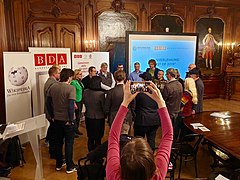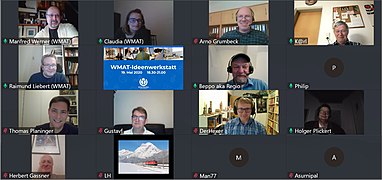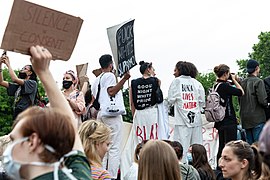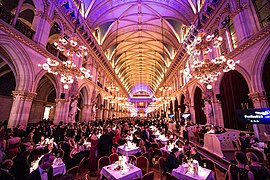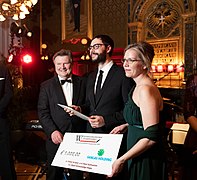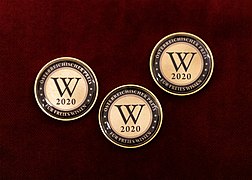Grants:APG/Proposals/2019-2020 round 1/Wikimedia Österreich/Progress report form
Purpose of the report
editThis form is for organizations receiving Annual Plan Grants to report on their progress after completing the first 6 months of their grants. The time period covered in this form will be the first 6 months of each grant (e.g. 1 January - 30 June of the current year). This form includes four sections, addressing grant metrics, program stories, financial information, and compliance. Please contact APG/FDC staff if you have questions about this form, or concerns submitting it by the deadline. After submitting the form, organizations will also meet with APG staff to discuss their progress.
Overview
editWe started the year with the implementation or planning of a number of major new initiatives, such as the Austrian Award for Free Knowledge or the (postponed) Queering Wikipedia Conference. The Austrian government began in mid-March with severe Covid19-related restrictions on life, which – in connection with significantly decreasing numbers of new infections – were gradually eased to a large extent from mid-April onwards. Our last offline event was a Women's Day edit-a-thon on 8 March. WMAT employees worked in the home office from mid-March to the end of May. During this period we managed our most significant staff change to date, when our long-term executive director took maternity leave until next year. New election rules at our first online general assembly could also have led to major changes in the board (which ultimately was not the case). In general we were able to mitigate bad effects on our communities, the fulfillment of our goals, and our finances through quick and well-considered action. However, the noticeable distortions caused by the crisis will continue to present us with challenges in the second half of the year.
Metrics and results overview - all programs
edit- Participants: The number of people who attend your events, programs or activities, either in person or virtually. This definition does not include people organizing activities, social media followers, donors, or others not participating directly.
- Newly registered: The number of participants that create new accounts on a Wikimedia project. These include users who register up to two weeks before the start of the event.
- Content pages: A content page is an article on Wikipedia, an item on Wikidata, a content page on Wikisource, an entry on Wiktionary, and a media file on Commons, etc. This metric captures the total number of content pages created or improved across all Wikimedia projects.
- Quality: High quality – the number of community decorations for media files (featured, quality, valued) and articles (quality, featured) – and improved quality – the number of improved main namespace pages tagged as having quality issues.
- Diversity: The number of participants and/or organizers of activities who belong to underrepresented groups in the Wikimedia movement in Austria. These groups are defined as women, lesbian, gay, bisexual and transgender people, persons belonging to ethnic, language or religious minorities in Austria, foreigners and people with disabilities.
Participants Newly registered Content pages Quality Diversity Targets for 2020 (total for all programs) 16,900 9,270 400,000 4,900 450 Progress until 2020-06-30 (total for all programs) 2,583 226 94,177 2,162 181
| Participants | Newly registered | Content pages | Quality | Diversity | ||||||
|---|---|---|---|---|---|---|---|---|---|---|
| Progress | Target | Progress | Target | Progress | Target | Progress | Target | Progress | Target | |
| All programs excluding two fiscal sponsorships | 1,935 | 3,500 | 126 | 200 | 78,087 | 140,000 | 1,429 | 2,900 (high quality: 400, improved quality: 2,500) | 116 | 410 |
| Wiki Loves Monuments international (fiscal sponsorship) | 0 | 13,000 | 0 | 9,000 | 0 | 250,000 | 0 | 2,000 (high quality: 2,000) | – | – |
| Wikimedia CEE Spring (fiscal sponsorship) | 648 | 400 | 100 | 70 | 16,099 | 10,000 | – | – | 65 | 40 |
| Total | 2,583 | 16,900 | 226 | 9,270 | 94,177 | 400,000 | 2,162 | 4,900 (high quality: 2,400, improved quality: 2,500) | 181 | 450 |
| Graphs | ||||||||||
| Calculation of progress | PARTICIPANTS All programs excluding two fiscal sponsorships 19 + 43 + 19 + 12 + 6 + 6 + 65 + 1 + 8 + 5 + 1 + 2 + 3 + 4 + 230 + 7 + 7 + 2 + 4 + 6 + 8 + 2 + 9 + 11 + 36 + 5 + 6 + 16 + 3 + 7 + 7 + 6 + 12 + 31 + 13 + 5 + 14 + 8 + 243 + 1 + 7 + 22 + 7 + 5 + 11 + 19 + 7 + 2 + 9 + 11 + 48 + 50 + 18 + 20 + 45 + 15 + 5 + 6 + 5 + 4 + 4 + 6 + 300 + 10 + 406 = 1,935 Wiki Loves Monuments international (fiscal sponsorship) Wikimedia CEE Spring (fiscal sponsorship) Total |
NEWLY REGISTERED All programs excluding two fiscal sponsorships Wiki Loves Monuments international (fiscal sponsorship) Wikimedia CEE Spring (fiscal sponsorship) Total |
CONTENT PAGES All programs excluding two fiscal sponsorships 7 + 7807 + 5 + 460 + 10492 + 449 + 1 + 271 + 15672 + 218 + 7357 + 19746 + 11418 + 20 + 5 + 870 + 2586 + 694 = 78,087 Wiki Loves Monuments international (fiscal sponsorship) Wikimedia CEE Spring (fiscal sponsorship) Total |
QUALITY All programs excluding two fiscal sponsorships 13 + 12 + 449 + 33 + 31 + 10 + 870 + 11 = 1,429 Wiki Loves Monuments international (fiscal sponsorship) Wikimedia CEE Spring (fiscal sponsorship) Total |
DIVERSITY All programs excluding two fiscal sponsorships 11 + 3 + 3 + 6 + 23 + 2 + 3 + 2 + 5 + 2 + 3 + 2 + 16 + 4 + 8 + 12 + 4 + 7 = 116 Wikimedia CEE Spring (fiscal sponsorship) Total | |||||
Telling your program stories - all programs
editCommunity Support
edit
-
COVID-19 face mask tailored by one of our community members
- A diverse community of volunteers with a wide range of skills, a desire to continually improve their work together and that offers a constructive working environment to existing and new users
What did we achieve so far?
| participants satisfied with WMAT’s general direction | |
|---|---|
| in 2020: | 94 % |
| in 2019: | 89 % |
| in 2018: | 94 % |
| in 2017: | 90 % |
| in 2016: | 86 % |
| in 2015: | 79 % |
Online meetings
Reacting to the impossibility of personal meetings and events, which play an important role in the German-language Wikiverse, we quickly developed a new comprehensive support program for video conferences. This includes the provision of the technical platform, optional personal support, the coordination of online meetings of the German-language Wikipedia community and the development of a special safe space policy for video conferences. The latter was particularly important to us, as neither the safety mechanisms of the Wikimedia projects nor our event guidelines apply to external platforms. Because we were seven weeks faster than the German and Swiss chapters with our support program, we served not only the Austrian community, but also the much larger German-speaking community for some time. Together with WMDE, we finally revised our safe space policy for video conferencing, which now applies in both Austria and Germany.
Participation and feedback
The temporary geographical expansion of our support area and our once again increased activity in the Wikimedia projects – especially through new competitions (see Free Content program) – ensured that we were well on target in terms of the number of participants, despite the cancellation of many events. Our annual anonymous Austrian community survey in June again showed very satisfying approval rates for our work: 94 % agreed or rather agreed that they were satisfied with WMAT’s general direction – one of the highest levels to date (see table on the right).
What are our biggest challenges?
Disruptions in community-building
The cancellation of face-to-face meetings and events has not only brought us new participants in online meetings, but we have also lost many people. In certain areas, we have to fear that our community-building efforts have been thwarted. This concerns particularly sensitive areas, including onboarding initiatives like our successful Social Topics on Wikipedia project. Our diversity figures are so far below our expectations – clearly an effect of the pandemic. It is particularly painful that we had to postpone the Queering Wikipedia Conference until next year, not only because we put a lot of time and effort into it. The conference should have diversified and empowered LGBTIQ+ presences in the Wikimedia projects on a global level.
Strategy
We as a movement must ensure that the discussion on the implementation of the Wikimedia 2030 recommendations does not lose momentum. Without a common understanding of the goals, it is difficult for us as an affiliate to bring our strengths to bear in the next phase. Also, the first bumpy steps in the rebranding process make us worried about the future acceptance of the strategy implementation in our communities.
What's up next?
From travel to online
Large portions of our budget in the Community Support program were earmarked for cancelled events (German-language WikiCon, Wikimania, Wikimedia Summit) and travel grants. We now want to use these funds primarily for projects that can be carried out online and that, if possible, create an infrastructure that can be used sustainably. For example, we want to increasingly support online communities which serve Free Knowledge outside of the Wikimedia projects, such as our RegiowikiAT, through an improved technical infrastructure.
| Metric | 2020 target | Progress | Graph | Calculation of progress |
|---|---|---|---|---|
| Community leadership:
Number of volunteer organizers of activities. |
250 | 122 | 3 + 1 + 1 + 1 + 3 + 1 + 9 + 1 + 4 + 2 + 1 + 1 + 13 + 1 + 1 + 2 + 2 + 1 + 11 + 1 + 2 + 2 + 1 + 1 + 14 + 6 + 1 + 1 + 1 + 1 + 1 + 1 + 12 + 3 + 2 + 1 + 1 + 1 + 8 + 1 + 1 = 122 | |
| Community motivation:
Minimum percentage of the participants of community surveys agree that our activities contribute to motivating them for their online work. |
80 | 85 | 85 |
Free Content
edit
-
COVID-19 face mask tailored by one of our community members
- Generating, opening, and distributing multifaceted and valuable content that fascinates and engages Wikimedia volunteers, partners, and readers alike
What did we achieve so far?
Wikidata contest
With a central-notice-based campaign around the International Museum Day in May we raised awareness about content gaps in Wikimedia projects about museums in Austria, France, Germany, Italy and Switzerland. This WMCH-led initiative was carried out in cooperation with WMAT, WMDE, WMFR and WMIT. Our main contribution to the campaign was conducting a community contest on Wikidata around items about museums in the respective countries, with a diversity focus regarding (minority) languages. We worked on a complex technical solution that significantly extended our ability to be active for the Wikidata community also in the future. More than 240 users enrolled in the competition (87 of them new editors) and nearly 20,000 Wikidata items were edited. This has also allowed us to ensure that we are well on track with our content pages metrics, despite the constraints of the pandemic.
Creative photography community
Our photo community was very resourceful to stay active under the difficult conditions. We are happy that we were able to support ideas like Wiki Loves Eggcups, a small photo competition around Easter where photos could be taken at home. We also noticed an increase in photos that were already taken last year and uploaded now instead of taking new ones.
What are our biggest challenges?
GLAM projects
Planned cooperation projects in the GLAM sector for content creation could not be implemented due to the pandemic. This affected, for example, our project started last year in which Wikimedians document traditional crafts in Austria on site in text, photography and video. Not only was it not possible to send Wikimedians to other places, but many institutions had closed or only limited operations. Our GLAM projects depend heavily on volunteers, for whom the appeal of such initiatives lies in personal contact and shared experience. We hope to catch up on some projects next year.
What's up next?
WikiDaheim
WikiDaheim is our big Austrian photo competition, which we first held four years ago as a further development of Wiki Loves Monuments and Wiki Loves Earth. It takes place from the beginning of July to the beginning of October. As usual, photos from the competition can also qualify for Wiki Loves Monuments. Because Wiki Loves Earth has a longer submission period internationally, photos from WikiDaheim can also qualify for Wiki Loves Earth for the first time. (The last regular Wiki Loves Earth in Austria took place in 2016.) The user interface of WikiDaheim has been improved again and the listings of interesting photo motifs in Austria have been extended.
Small time shifts
We did not spend much money on the Free Content program in the first half of the year. Unlike the Community Support program, where we have to make major adjustments to activities, this is mainly due to short delays in activities that continue to be carried out. For example, due to the pandemic, the jury of the German-language Wikipedia Writing Competition, for which we sponsor the prizes, took a little longer to reach a decision. Similarly, purchases for our photography projects were delayed because it took longer to obtain the recommendations of our expert groups without face-to-face meetings.
| Metric | 2020 target | Progress | Graph | Calculation of progress |
|---|---|---|---|---|
| Useful content:
Number of distinct new media files used in the main namespace of Wikimedia projects. |
5,000 | 1,439 | 183 + 286 + 204 + 310 + 382 + 74 = 1,439 | |
| Versatile content:
Number of total usages of new media files files in main namespace. |
10,000 | 4,294 | 777 + 1082 + 447 + 782 + 1039 + 167 = 4,294 | |
| Free content beyond Wikimedia projects:
Number of freely licensed content pages in Non-Wikimedia projects (e.g. RegioWiki). |
1,000 | 957 | 941 + 16 = 957 |
Reach / Free Knowledge Awareness
edit
-
COVID-19 face mask tailored by one of our community members
- Creating collective impact on a societal level by working with and through others to achieve a greater impact than we could ever achieve alone
What did we achieve so far?
Austrian Award for Free Knowledge
At the beginning of the year we organized the Austrian Award for Free Knowledge for the first time. The award was presented by the Mayor of Vienna and the Minister for Technology and Innovation at the renowned Vienna Ball of Science. The Open Knowledge Maps association won in the Civil Society Engagement category. The FWF Austrian Science Fund was named Institution of the Year 2020. For us, the award was an important step towards raising awareness of the importance of Free Knowledge in Austria. Independently of this, we again held our popular award ceremony for the best achievements of the Wikimedia community in the Vienna Imperial Palace.
Wikiversity
Under the label of Wikiversity Austria, we have been working for several years to anchor Wikimedia projects and goals in courses at Austrian universities. From a pedagogical point of view, active editing by students plays an important role in this process. For the first time we have succeeded in holding a course at the University of Vienna exclusively on the topic of Free Knowledge. When, due to the pandemic, courses at Austrian universities were later only held online, we were able to distinguish ourselves as experts in this field at the University of Vienna. We have been working for many years with our own concept for Wikipedia introductory courses, where all participants have the feeling of success after three hours that they have published their first Wikipedia article. We revised this concept for video conferences at an edit-a-thon at the University of Vienna, at least for small groups.
What are our biggest challenges?
Sustainable outreach network
Increasing our sustainable outreach network – in terms of accounts reached with social media and our newsletter – is one of our goals in this program. Recently, we have seen a decline in the importance of Facebook. The increasing number of our Twitter subscribers has not been able to compensate for this deficit. As an additional measure, we are now also present on Instagram, other social media might follow. The additional effort for our staff must not have a negative impact on the achievement of other goals.
What's up next?
Legal framework
Already in January we co-organized a coordination meeting with our netpolitical partners in Austria to analyse the new government program regarding common challenging. The transposition of EU copyright reform and especially plans to prohibit anonymous handles on media platforms could affect us the most. We are expecting new draft legislation on some of these issues in the near future.
| Metric | 2020 target | Progress | Graph | Calculation of progress |
|---|---|---|---|---|
| Sustainable outreach network:
Number of accounts reached with permanent online channels (newsletter and social media, e.g. Facebook, Twitter, YouTube). |
5,000 | 4,212 | Facebook: WMAT: 1,044, WLE: 321, Wikidaheim: 105, WMAT advent calendar: 90, Wikidata-AT: 51, Wikipedia-AT: 79; Twitter: WMAT: 1,715, Wikidata: 334; Youtube: 23; Instagram: 95; Newsletter: 355 = 4,212 accounts reached | |
| Sustainable partnerships:
Amount of in-kind donations from partner organizations. |
17,000 EUR | 7,315 EUR | List of in-kind donations in 2020 |
Revenues received during this six-month period
editPlease use the exchange rate in your APG proposal.
- Important note
- the anticipated column may list revenues anticipated for the whole year instead of only the 6 months. Please make sure that this the time period clear in the table.
- In the explanation column, always mention relevant information about the numbers: what period they refer to etc.
Table 2 Please report all spending in the currency of your grant unless US$ is requested.
- Please also include any in-kind contributions or resources that you have received in this revenues table. This might include donated office space, services, prizes, food, etc. If you are to provide a monetary equivalent (e.g. $500 for food from Organization X for service Y), please include it in this table. Otherwise, please highlight the contribution, as well as the name of the partner, in the notes section.
Revenue source Currency Anticipated Q1 Q2 Q3 Q4 Cumulative Anticipated ($US)* Cumulative ($US)* Explanation of variances from plan FDC grant EUR 265,000 - 0 0 289,282 0 1st installment of 145,749.70 EUR (which reflects WLM 2018 underspend deduction of 8,924.63 EUR and bank fee reimbursement of 91 EUR) already received in the past fiscal year ODP grants EUR 2,000 - 0 0 2,183 0 Fundraising EUR 23,000 - 9,972 9,972 25,107 10,886 Membership fees EUR 3,000 - 2,972 2,972 3,275 3,244 Other (non-WMF) grants EUR 5,500 - 0 0 6,004 0 Erasmus+ grant separately below Erasmus+ grant EUR 0 - 21,539 21,539 0 23,513 Final installment of past year's grant + 1st installment of this year's grant of EUR 24,750 (which was not included in the budget yet) CEE Spring EUR 9,500 - 3,838 3,838 10,370 4,190 WLM International EUR 32,000 - 11,750 11,750 34,932 12,827 Queering Wikipedia EUR 39,720 - 0 0 43,360 0 Event grant already received in the past fiscal year Interests EUR 0 - 49.86 49.86 0 54 In-kind donations EUR 16,000 - 7,315 7,315 17,466 7,985
* Provide estimates in US Dollars
Spending during this six-month period
editPlease use the exchange rate in your APG proposal.
Table 3 Please report all spending in the currency of your grant unless US$ is requested.
- (The "budgeted" amount is the total planned for the year as submitted in your proposal form or your revised plan, and the "cumulative" column refers to the total spent to date this year. The "percentage spent to date" is the ratio of the cumulative amount spent over the budgeted amount.)
Expense Currency Budgeted Q1 Q2 Q3 Q4 Cumulative Budgeted ($US)* Cumulative ($US)* Percentage spent to date Explanation of variances from plan Staff expenses EUR 151,000 - 77,898.37 77,898.37 164,836 85,036 52% Operations EUR 47,000 - 21,811.76 21,811.76 51,307 23,810 46% Community Support EUR 59,500 - 6,261.40 6,261.40 64,952 6,835 11% Realignment or postponement of many activities to the second half of the year because of the pandemic. Free Content EUR 24,000 - 2,569.77 2,569.77 26,199 2,805 11% Realignment or postponement of many activities to the second half of the year because of the pandemic. Reach /Free Knowledge Awareness EUR 17,000 - 1,096.48 1,096.48 18,558 1,197 6% Realignment or postponement of many activities to the second half of the year because of the pandemic. CEE Spring EUR 9,500 - 477.59 477.59 10,370 521 5% Contest just finished, distribution of prices has just begun. WLM International EUR 32,000 - 12,848.89 12,848.89 34,932 14,026 40% Expenses so far mainly concern last year's grant. Queering Wikipedia EUR 39,720 - 6,000.83 6,000.83 43,360 6,551 15% Conference postponed to next year. TOTAL EUR 379,720 - 128,965.09 128,965.09 414,514 140,781 34%
* Provide estimates in US Dollars
Compliance
editIs your organization compliant with the terms outlined in the grant agreement?
editAs required in the grant agreement, please report any deviations from your grant proposal here. Note that, among other things, any changes must be consistent with our WMF mission, must be for charitable purposes as defined in the grant agreement, and must otherwise comply with the grant agreement.
- No changes
Are you in compliance with all applicable laws and regulations as outlined in the grant agreement? Please answer "Yes" or "No".
- Yes
Are you in compliance with provisions of the United States Internal Revenue Code (“Code”), and with relevant tax laws and regulations restricting the use of the Grant funds as outlined in the grant agreement? Please answer "Yes" or "No".
- Yes
Signature
edit- Once complete, please sign below with the usual four tildes.
- --Raimund Liebert (WMAT) (talk) 11:56, 28 July 2020 (UTC)
Resources
editResources to plan for measurement
edit- Global metrics are an important starting point for grantees when it comes to measuring programmatic impact (Learning Patterns and Tutorial) but don’t stop there.
- Logic Models provide a framework for mapping your pathway to impact through the cause and effect chain from inputs to outputs to outcomes. Develop a logic model to map out your theory of change and determine the metrics and measures for your programs.
- Importantly, both qualitative and quantitative measures are important so consider both as you determine measures for your evaluation and be sure to ask the right questions to be sure to capture your program stories.
Resources for storytelling
edit- WMF storytelling series and toolkit (DRAFT)
- Online workshop on Storytelling. By Frameworks institute
- The origin of storytelling
- Story frames, with a focus on news-worthiness.
- Reading guide: Storytelling and Social change. By Working Narratives
- The uses of the story.
- Case studies.
- Blog: 3 Tips on telling stories that move people to action. By Paul VanDeCarr (Working Narratives), on Philanthropy.com
- Building bridges using narrative techniques. By Sparknow.net
- Differences between a report and a story
- Question guides and exercises.
- Guide: Tools for Knowledge and Learning. By Overseas Development Institute (UK).
- Developing a strategy
- Collaboration mechanisms
- Knowledge sharing and learning
- Capturing and storing knowledge.

